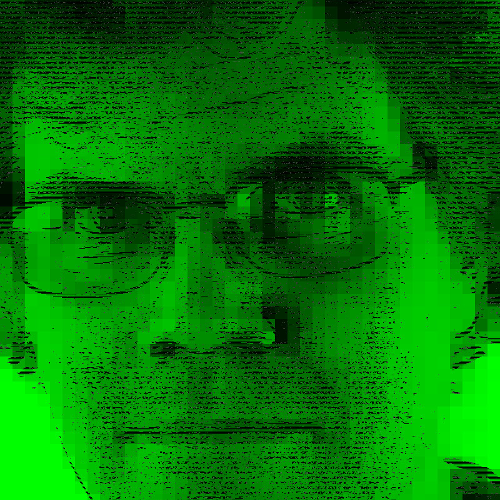Back when I was a humble computer science university student learning how to write operating systems, we learned a simple trick.
A computer might run several programs at the same time: a web browser in one window, a text file editor in another window, several programs that don't even have windows… There are so many programs running that they can't actually run at the same time; there aren't enough CPU chips to go around. Instead, the special operating system program sets up a schedule: a fraction of a second for the web browser, a fraction of a second for the text editor, etc. To make an efficient schedule, it helps if you can predict how much longer a program needs to run. For example, that text editor program probably doesn't have much to do, assuming the user hasn't typed anything in the past ⅛ second. That program probably just needs to wake up, re-draw the blinking text cursor, and go back to sleep. On the other hand, a program that reads and sorts all the text of Wikipedia needs much more time. A naive operating system that scheduled equal CPU time to each of these programs would leave that CPU twiddling its metaphorical thumbs much of the time.
We learned a trick to predict how long a program will want to run. Consider how long the program has already been running. On average, it's about halfway done. If the program has run about a quarter second so far, it probably needs another quarter second. This trick isn't always right—if you just start running that Wikipedia-sorting program a quarter second ago, this trick gives you the wrong answer. But on average, it gives you about the right answer.
Other folks, not just computer science students, use this trick for guesstimating mysterious durations. For example, if you want a guess about how long a musical production will continue its run on Broadway (when we get Broadway back), consider how long it's already been running. There's a name for this trick: the Copernican Principle. Well, the Copernican Principle isn't exactly about estimating durations; it's the idea that the observer of a phenomenon shouldn't think they (the observer) are too special. Copernicus was famous for not-assuming that the earth was the center of the universe. It's similar to think "We're probably not at the very start of this thing; we're probably not at the very end; on average, we're probably about in the middle." This trick isn't great. If you have any information about how long something should last, you should use that information, not this trick. E.g., if the sun rose an hour ago, this trick guesstimates that the sun will set in about an hour; but your knowledge of how days work yields the much better estimate of 11 hours.
Some folks used this trick to guesstimate how long the human race will stick around: several thousand years of civilization followed by a couple of hundred thousand years of species survival. This was a terrible mistake. I don't say it was a terrible mistake because I disagree with its estimate. I say it was a terrible mistake because many philosophers and pundits have opinions about the immanent or not-so-immanent end of [civilization|human life|whatever], and all of these people and their opinions crawled out of the woodwork to yell at each other. This book, The Doomsday Calculation, tells the story of their arguments.
For example, the human population has surged in the past few centuries. It's all very well for someone to have said "When you're trying to guesstimate how long human civilization will last, on average you can guess you're about in the middle," but the chances that they said this in the 1600s or later, because most humans were in the 1600s or later. If someone says "Maybe we'll be around much longer than 'the trick' suggests—like someone an hour after sunrise estimating when sunset is coming," you should raise an eyebrow: odds are, you're a modern Indian not an early Sumerian. (Some folks, including this book's author, think this implies that doomsday is coming soon—perhaps in 700 years or so. I think the trick suggests that in 800 years we won't be doomed—but we can expect, on average, to have declined to an existence like that humanity had 800 years ago: not great.)
The book gets into some interesting territory. Given that humans are intelligent but haven't been contacted by intelligent aliens, what does "the trick" suggest? If the rules of Physics were just a little different, the universe couldn't support life—and "the trick" uses that fact to suggest that ours might be a universe within a multiverse just like the comic book movies told us (but maybe with fewer Spider-Men).
Though the book is interesting, it does point out that it's silly to use "the trick" to predict how long homo sapiens will be around. Remember: if you know how long a day lasts, you shouldn't use "the trick" to predict sunset time; instead, use your knowledge, knowledge is more accurate. Fossil-studying scientists know some things about how long species last before extinction. We should use that knowledge instead of just shrugging and guessing "We'll be around about as long as we've been around, on average." (Fossil knowledge doesn't make the doomsday-timeline-arguments go away; we're in a mass extinction event so you need to follow up that "species tend to last 3 million years" with "…uhm, unless there's some mass extinction event going on, that could pull in the timeline, uh-oh.") But the book doesn't look too closely at this—there are other books for that. This book is about high-falutin' applications of the Copernican Principle.
